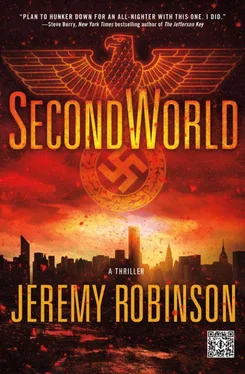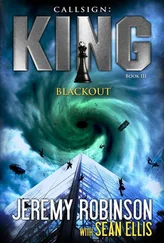Fallen leaves and dry branches cracked beneath the careful approach of a lone figure. Miller watched him through the brush. He had the same look as the Miami gang—shaved head, blond hair, blue eyes, the military-grade rebreather—but a few details set him apart. He held the confident posture of a hunter. His black fatigues were similar to those worn by U.S. Special Ops on night missions. But his weapon stood out the most and made no sense. The Karabiner 98k was a five-shot bolt-action rifle sometimes fitted with an optical scope for sharpshooting. It was the standard infantry weapon of the Germans in World War II. But here it was, in the year 2012, held by the man who had just tried to kill him. In the open, with some space between them, the sniper had the advantage. Here in the brush, with twisting branches all around, the long rifle would be unwieldy. But if he reached the clearing…
Miller rose from his hiding spot and raised his weapon. The wound on his left shoulder pounded through him as he fired the first shot. The pain threw off his aim, and the bullet zinged past the sniper’s head.
The man ducked and raised his rifle, but it snagged on a branch and his shot dug into the dirt at Miller’s feet. As the man chambered a second round, Miller took careful aim. Before he could pull the trigger, he noticed the sniper was about to fire from the hip and ducked instinctively. Both shots went wild.
He had no idea how many shots the sniper had left in his five-shot magazine, but he knew how many he had left—none. He left the brush behind and charged through the sloped clearing. When the man charged as well, Miller knew they were both out of ammo. But the stranger still had the advantage. Not only was he not wounded, but the rifle had been fitted with a very sharp bayonet, which essentially turned it into a short spear.
The two met in the center of the clearing, both moving fast. The sniper thrust the bayonet toward Miller’s chest. He spun like a football player, dodging the blade with his body, but felt a tug on something as he passed. He gave it no thought as he continued his spin and pistol-whipped the man in the back of the head.
The two men separated. As Miller watched the man stagger for a moment, he thought he’d gained the upper hand. But the man’s smile, twisted by the thick plastic of his rebreather mask, revealed otherwise. Miller found out why a moment later.
He couldn’t breathe.
The hose that supplied air from Miller’s rebreather to his mask had been severed by the knife.
The ramifications of this struck both men at the same time. The sniper didn’t need to fight. All he had to do was wait. Without air, Miller would soon drop dead without another blow landed.
The man turned to run, but stumbled, weakened by the hard blow to his head. Miller charged, his subconscious counting down the minutes his body could keep going without another breath, and then cutting that time in half because of the oxygen being eaten up by physical exertion.
Miller caught the man’s shoulder and spun him around, but had to jump back as the bayonet swooshed past his stomach. The man’s quick strike overextended his arms and Miller filled the gap, planting a punch into the man’s stomach. The blow would have sent most men to the ground, gasping for air, but the sniper was a trained fighter. He flexed his stomach muscles and sucked in his gut, absorbing the blow’s energy, and keeping his air—of which he had plenty—in his lungs.
In close, the sniper twisted the butt of his rifle up and caught Miller in the side of the head, sending him to the ground. Miller reached out as he fell and managed to pull the face mask from his attacker.
The effects of asphyxiation assaulted Miller. Dizziness and blurred vision blinded him to the man’s approach. Then the man’s weight was on his chest, forcing out what little air remained in his lungs. The sniper tore Miller’s mask away.
The man grinned and spoke English with a heavy German accent. “It has been a long time since I took a life.”
The man pressed his rifle’s long barrel against Miller’s throat and pushed, though it was really just a symbolic gesture since Miller couldn’t breathe anyway.
Miller grasped the rifle and with the last of his strength, pushed back.
The German laughed. “Your struggle is admirable, but ultimately futi—”
Miller let go of the rifle and swung the bayonet, which he’d managed to unscrew with his fingers, into the German’s side. But it didn’t bite flesh. Instead, it stabbed through the man’s rebreather and punctured something inside. As a loud hiss filled the air, the man turned toward the sound. Miller withdrew the bayonet and struck again, this time slamming the blade into the side of the German’s head. The man slumped over without a sound.
Miller stood on shaky feet, his vision narrowing, his thoughts confused. He tried to reconnect his severed rebreather hose, but without tape to seal it back together, most of the air seeped away. All he could think about was the car and Arwen. He started back, stumbling through the brush, snapping branches and fighting to keep his eyes open. A glint of silver ahead shone like a beacon. He fell from the bushes, landing on the hood. Sliding along it, he found the door, opened it, and fell inside. With the door closed, he took several deep breaths.
Nothing. No improvement.
The car held no air, or at least not enough to help.
Arwen’s silence confirmed it.
That’s when he remembered the four golf ball–sized holes in the front and back windshields. He’d left Arwen behind, without air, to die on her own.
Miller reached back and cranked the oxygen tank’s valve all the way open. It hissed pure oxygen into the car. His head cleared and his vision returned. He checked Arwen and found a pulse. Unconscious, but alive. Next he removed his T-shirt and tore it into four pieces, balling them up and shoving them into the window’s holes. They wouldn’t stop all the air from escaping, but they were something.
Knowing the oxygen tank wouldn’t last long, he pushed the car’s starter button. When it clicked at him, he feared the car had been wrecked, but quickly realized the silent vehicle had never shut off. He threw the car into reverse and pulled back onto the highway.
Branches flew from the car and red dust billowed behind it as Miller hit the gas and pushed the vehicle to its top speed of 120 miles per hour. The highway passed in a blurry haze of red flakes.
Miller looked down at Arwen. She was tiny and frail and innocent. She didn’t deserve to die like this. The millions of people lying dead in the city shrinking behind them didn’t deserve to die like they did, either. He thought of the gang back in Miami. He saw the sick grin of the German sniper, leering down at him.
“Fuck you,” Miller said to the red sky.
“Who are you talking to?” Arwen asked, her voice weak.
Miller breathed a sigh of relief. “The sky.”
“What’d the sky do to make you so upset?”
Miller’s tension bled away. “Aside from raining down oxygen-stealing red crap?”
Arwen glanced up. “Right. That.” She wheezed. “Hard to breathe.”
Miller motioned to the T-shirt-stuffed holes in the window. “We’ve got a leaky ship.”
“We going to make it?”
There was no way to answer that question. Too many variables were still unknown. How far did they have to go? Had the rest of the world been attacked? How long would the oxygen tank last before it ran dry? The only real information he had was the battery charge. They had fifteen minutes left. Driving at full speed drained the battery fast. He’d been looking for signs of a drugstore or hospital close to the highway, but saw none. He’d considered slowing the pace, but if the air ran out before the battery, what was the point? Time was the enemy and speed was his only weapon.
Читать дальше












